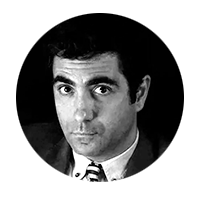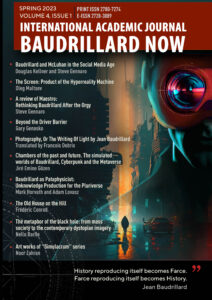◾️ Oleg Maltsev (Ukraine) (Editor)
◾️ Athina Karatzogianni (Great Britain)
◾️ Bernardo Attias (USA)
◾️ Douglas Kellner (USA)
◾️ Lucien Oulahbib (France)
◾️ Serge Bramly (France)
◾️ Steven Best (USA)
◾️ Nello Barile (Italy)
CHIEF EDITOR

OLEG MALTSEV
Author, criminologist, psychologist. Founder and director of Expeditionary Corps, The Memory Institute. Chairman of Odessa Photographic Scientific Society.
Email: drmaltsev.oleg@gmail.com
EDITORIAL BOARD

ATHINA KARATZOGIANNI
Professor in Media and Communication at the University of Leicester. Her work investigates the use of ICT by dissidents, social movements and insurgency groups.
Email: athina.k@gmail.com

BERNARDO ATTIAS
Professor at CSUN, accomplished DJ, poet, and artist, he brings his creative energy and interests into his scholarship and pedagogy. The emphasis of much of his work is on the political economy of mass mediated events.
Email: bernardo.attias@csun.edu

DOUGLAS KELLNER
Author, critical theorist. Distinguished Professor in the Departments of Education, Gender Studies, and Germanic Languages at UCLA. Kellner is an author of the Baudrillard page in Stanford Online Encyclopedia.
Email: kellner@ucla.edu

LUCIEN OULAHBIB
Author, lecturer, sociologist, political scientist. Currently, he lectures at Albert le Grand Institute. He spent many years working together with Jean Baudrillard.
Email: lucien.oulahbib@free.fr

SERGE BRAMLY
Novelist, ethnologist, screenwriter, art critic, and historian of photography. Photography “mentor” of Baudrillard and organizer of his first photo exhibition.
Email: sbramly@gmail.com

STEVE BEST
Professor at the University of Texas, El Paso. Author, speaker, public intellectual. He is co-author (with Douglas Kellner) of postmodern studies trilogy.
Email: best@utep.edu

NELLO BARILE
Author and Associate Professor at the Department of Communication at IULM University (Milan). His research interests include sociology of media and communication, culture, fashion, consumption, and politics.
Email: nello.barile@iulm.it



Recent Comments